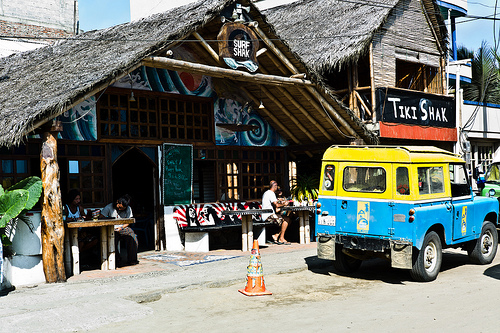
Thinking about retiring overseas but concerned you might make a less-than-worthy choice because you can't afford to visit all the places on your wish list before you make your final decision?
Just because you've little money doesn't mean you have to stay at home. With a bit of ingenuity, and a dash of wit and wangle, you can travel practically for free.
How? By thinking out of the box when it comes to where you stay. Here are six suggestions for getting your accommodation for free or next-to-nothing.

Photo by Hugo Ghiara, InternationalLiving.com
1.Couchsurfing. To learn more, see www.couchsurfing.org. This network of kind souls around the world agree to offer an extra bedroom, couch, or corner of the floor to travelers in exchange for the same kindness when they visit your town.
2.Houseswapping. As implied, this scheme involves trading homes for an agreed-upon amount of time. It works best if your home is in a locale someone wants to visit. And if your dates coincide. There are many websites to use to hook up with fellow swappers. One of the best-known is www.homeexchange.com.
3.Caretaking/Housesitting. Now things start to get interesting. Because the obligation here isn't to share your own digs but to tend to someone else's. If you're up for watering plants, scratching the kitties behind the ears now and then, and generally doing what needs to be done around the house, then you stay for free. Learn more and start your search for a caretaking gig at www.housecarers.com and www.caretaker.org.
4.Staying in Convents or Monasteries. Even though the only thing holy about us is our socks, we love this idea. A book called "Good Night & God Bless," by Australian Trish Clark, explains how to find inexpensive, clean, safe and well-located accommodation in the convents and monasteries of Europe. Learn more at www.goodnightandgodbless.com.
Convents and monasteries often charge a stipend... and not all of them are low-budget. If, though, you're willing to offer your services and do some work in exchange, the 'powers that be' may be willing to cover your keep. You'll find listing of worldwide monasteries at www.deoestgloria.com.
If it's a totally free stay you're after, you'll have the best luck at Buddhist monasteries, which traditionally don't charge for accommodation. Many, though, limit first-time visitors to one week and reservations are required. You're also required to participate in community life (no coming and going as you please) so don't think of this as a hotel stay but as a 'working vacation.'
5.Renting Rooms from Families. This may be the very best way to immerse yourself in the local language, culture, and customs. Homestays are often offered by language schools, but you needn't be enrolled in classes to take advantage of these low-cost local accommodations.
How to find a room for let? Usually, it involves pounding the pavement once you've landed in a new locale. Ask locals--especially those with storefront businesses. They often live behind the shop and may have a room for rent. (Sylvia, at Farmacía San Francisco in Cotacachi, Ecuador, for example, rents a room in her home.)
You can also check public bulletin boards and libraries, local newspaper classifieds, and inquire at language schools. And before you leave home, try searching in-country Craigslists and Internet forums, and e-mailing local language schools to ask for recommendations. The Warren Hardy Spanish School in Mexico's San Miguel de Allende, for example, posts a list of host families and rooms for rent, with contact details, here.
6.Freeloading-- otherwise known as 'staying with friends.' Living and traveling the world this past decade has earned us lots of friends hither and yon. We feel fortunate to have a guest room available to us in places like Puerto Vallarta, Panama City, the Pacific Coast of Nicaragua, Tuscany, Shenzhen and Shanghai. And if you do, too, be sure to take advantage of that if you can.
If you're not as fortunate, there's no reason you can't be. Find a pen pal at websites like Interpal (www.interpal.net), PenPal World (www.penpalworld.com), and International Pen Friends (www.ipfeurope.com). Then see what transpires. Be sure to exercise caution, though. Ask for photos, references, and anything else you need to feel comfortable. And always keep friends and family at home apprised of your travel plans.
If you're creative, you'll find lots of ways to travel on the cheap. Many safe, clean and comfortable accommodation options are out there... and not all of them are listed in guide books and on the Internet. One of our favorite ways to travel is without an itinerary. Once you get where you're going, visit a selection of hostels and small hotels within walking distance of the main town plaza, for instance. Ask to see a room, and check the sheets and pillows, test the hot water, and always ask for a discount off the first-quoted price. We've had great luck with this, including a great stay at a $7/night hostel in Baños, Ecuador... breakfast included.
And P.S. Another place to make friends with fellow travelers and expats the world over is International Living's Facebook page: www.facebook.com/InternationalLiving
Read More
How to Enjoy Your Retirement On the Road
A Round-the-World Trip... for Less Than $420
The Best Things in Life Are Still Free in Montevideo, Uruguay
Earlier on Huff/Post50:
